Leave home, leave the country, leave the familiar. Only then can routine experience—buying bread, eating vegetables, even saying hello—become new all over again. - Anthony Doerr
18 October 2019, Sawla (sidetrip to Wa)
Aliza Wazum Guest House 30GHC (R86)
I don’t like being scolded, but today I learned something in the process, and was reminded of a thing or two in the process. We travelled by tro-tro (mini-bus) to Wa to visit the Wa Naa’s royal palace. It was very hot by the time we entered the palace grounds. We could see the palace facade across an open expanse of ground, and to our right was a large tree with several men sprawled in idle conversation on and near its protruding roots. We approached the smaller group of men on one side of the trunk, there being enthusiastically greeted and having our hands vigorously shaken by a man who was clearly mentally disabled. That done, we told another man we had come to visit the palace and he took us around to the other side of the trunk and pointed out one of the four men there as being the one to whom we should speak. The four men were having a conversation which we were reluctant to interrupt, so we stood around waiting for our guide to acknowledge us. When they continued to talk to each other, ignoring us, I grew vastly irritated, saying to Charl there must be someone else in charge of showing tourists around and beginning to walk away. Behind me, I heard Charl engage with the men, and returned to be told we should have greeted them, that they were humans like us. I was shocked and annoyed to have the race card played, and tried to explain that in our culture it would be rude to break into their conversation, and that usually the host / guide / business owner would make an effort to greet and make his guests feel at home. In later, calmer conversation with our guide, Ibrahim (nicknamed Gaddafi following a childhood visit to Libya), he reminded us how important greetings are in African culture, and explained the rule, unknown to us until this moment: the one who is walking greets the one who is sitting. We have often discussed why it is that we seem to be required to greet first. We can see that people in villages are eager to engage, but they almost always wait for us to say something first before breaking into greetings and grins (the exceptions being the very young and the very modern). We guessed at two possibilities: the first, which we hoped was not the case, was an anxiety about greeting whites; the second, that strangers must greet first to show goodwill. I suppose we came close to the actual “rule” with our second guess.
So… I was reminded of two things: greetings in African culture are fantastically important, something we have had to learn on this trip. When you get in a bus, you greet your fellow passengers; when you get into a taxi, you don’t simply say, “airport please”, you greet first, ditto a shop. I was reminded also how quickly cultural misunderstandings can spiral out of control. The men waiting for us to greet them, felt the same annoyance we felt waiting for them to acknowledge us. They thought we were being rude; we thought they were. With a little more testosterone in the mix…
The palace facade, according to World Monuments Fund, is “an extraordinary example of traditional Sudanese mud-brick architecture”. The 19th-century structure “is built using sun-dried mud-brick walls and Y-shaped wooden columns to support flat roofs of a bush-pole framework which are covered with mud”. Mud-brick buildings are susceptible to rain and must be maintained annually by skilled artisans, one reason why the interior structures have been replaced with modern buildings to house the extended family. Another reason for the dilapidated state of the palace is a long dispute, recently resolved in the courts, about who the new chief was to be. Again, as in Busunu, we were surprised at the level of poverty and discomfort within a royal compound.
Wa lies just 90km from Sawla yet it took three hours by tro-tro each way. On our trip to Wa, we did not have to wait long for the tro-tro to depart; on our trip back, I think we spent well over an hour at the bus station waiting for the vehicle to fill. Waiting in heat and noise and dust and the smell of urine. The road between the two towns is badly potholed, making for a bumpy, slow, dusty journey. On neither vehicle did the hand brake work. On the way north, the driver had to stop often to on- or off-board passengers. He had to get out of his seat each time as the sliding door was very difficult to open and close, so passengers needed his assistance. Each time, he had to place blocks in front of and behind the front wheel. On the way south, the driver got out once to replace his back bumper which had fallen off. When he was not in his seat, the bus began to roll backwards and both he and his assistant had to run and find rocks with which to wedge the wheels.
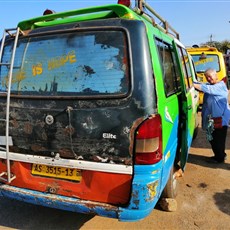
Leaving Sawla en route Wa
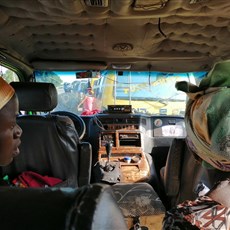
Leaving Sawla en route Wa
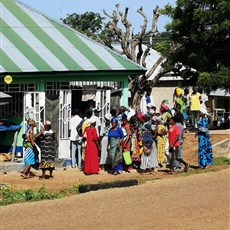
En route Wa
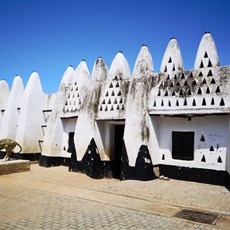
Wa Naa palace
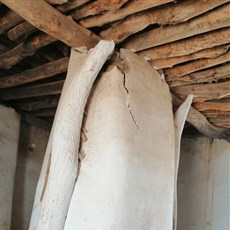
Wa Naa palace
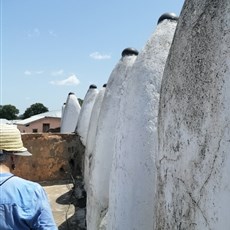
Wa Naa palace
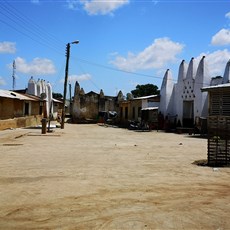
Wa Naa palace
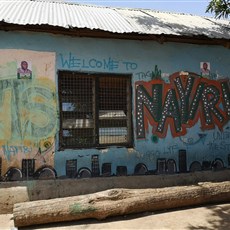
Wa Naa palace
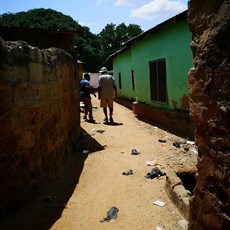
Wa Naa palace
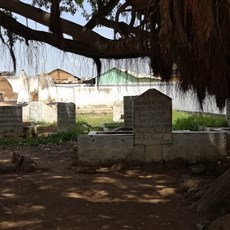
Wa Naa palace
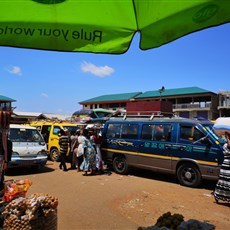
Wa bus station
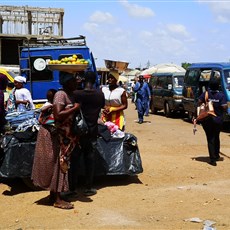
Wa bus station
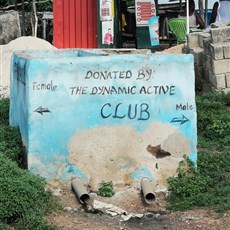
Wa to Sawla - public toilet